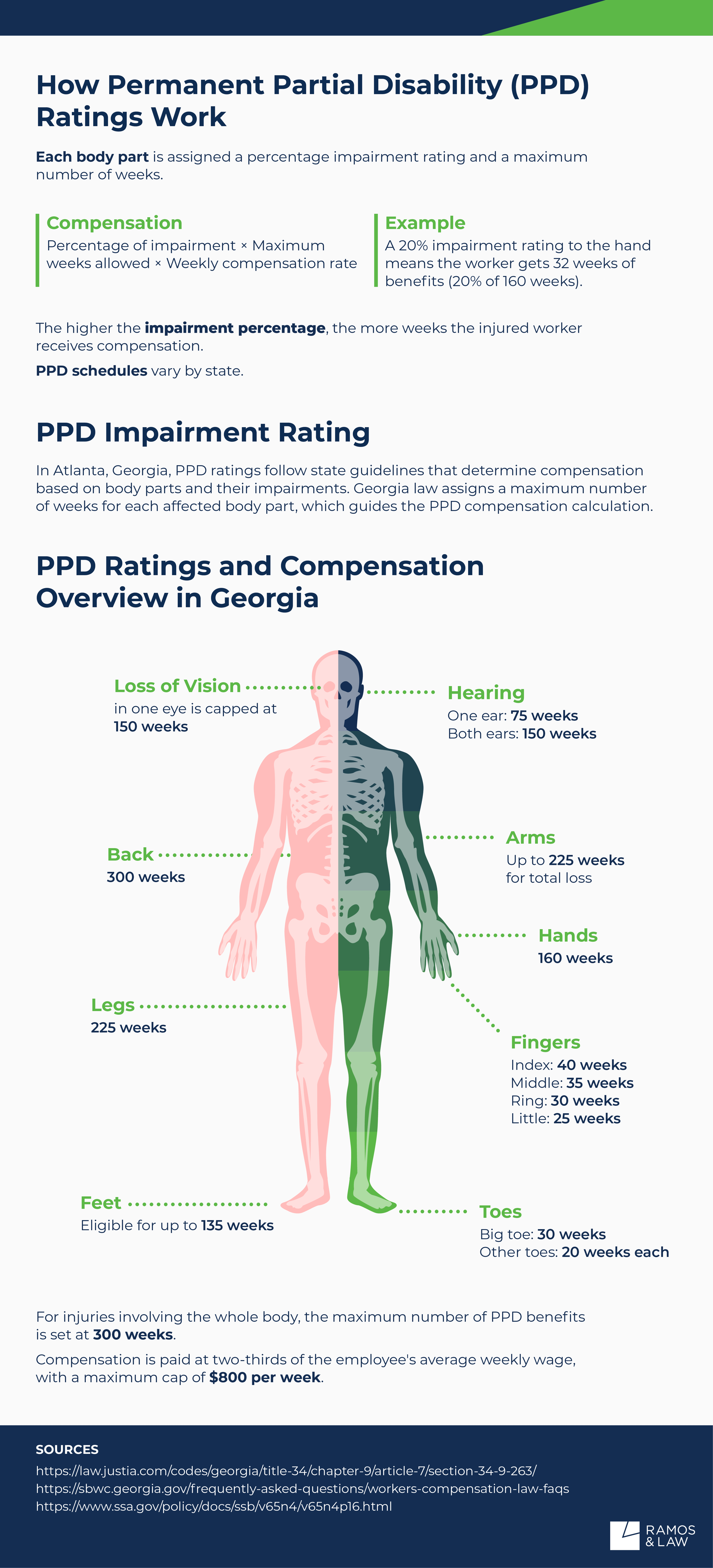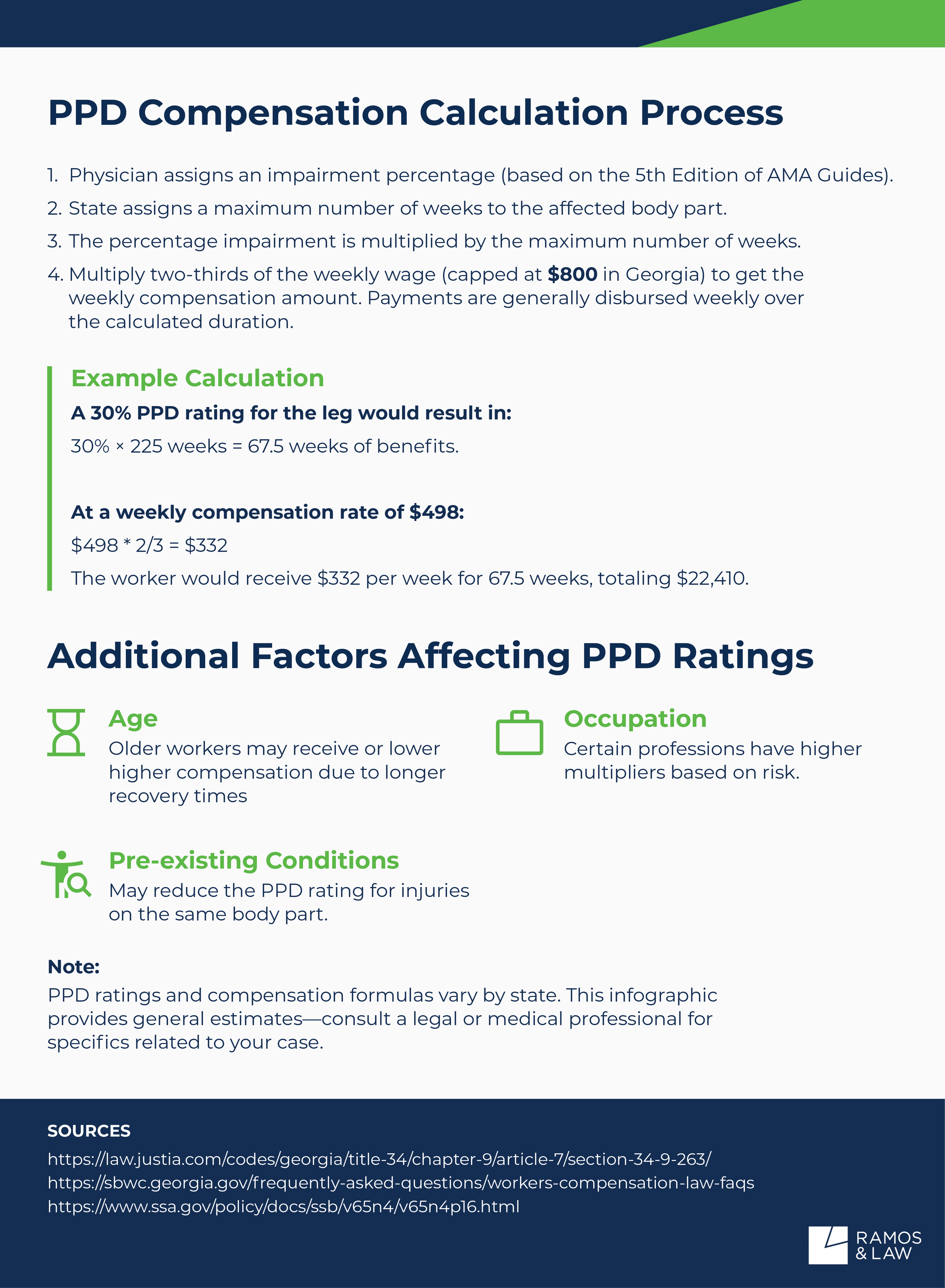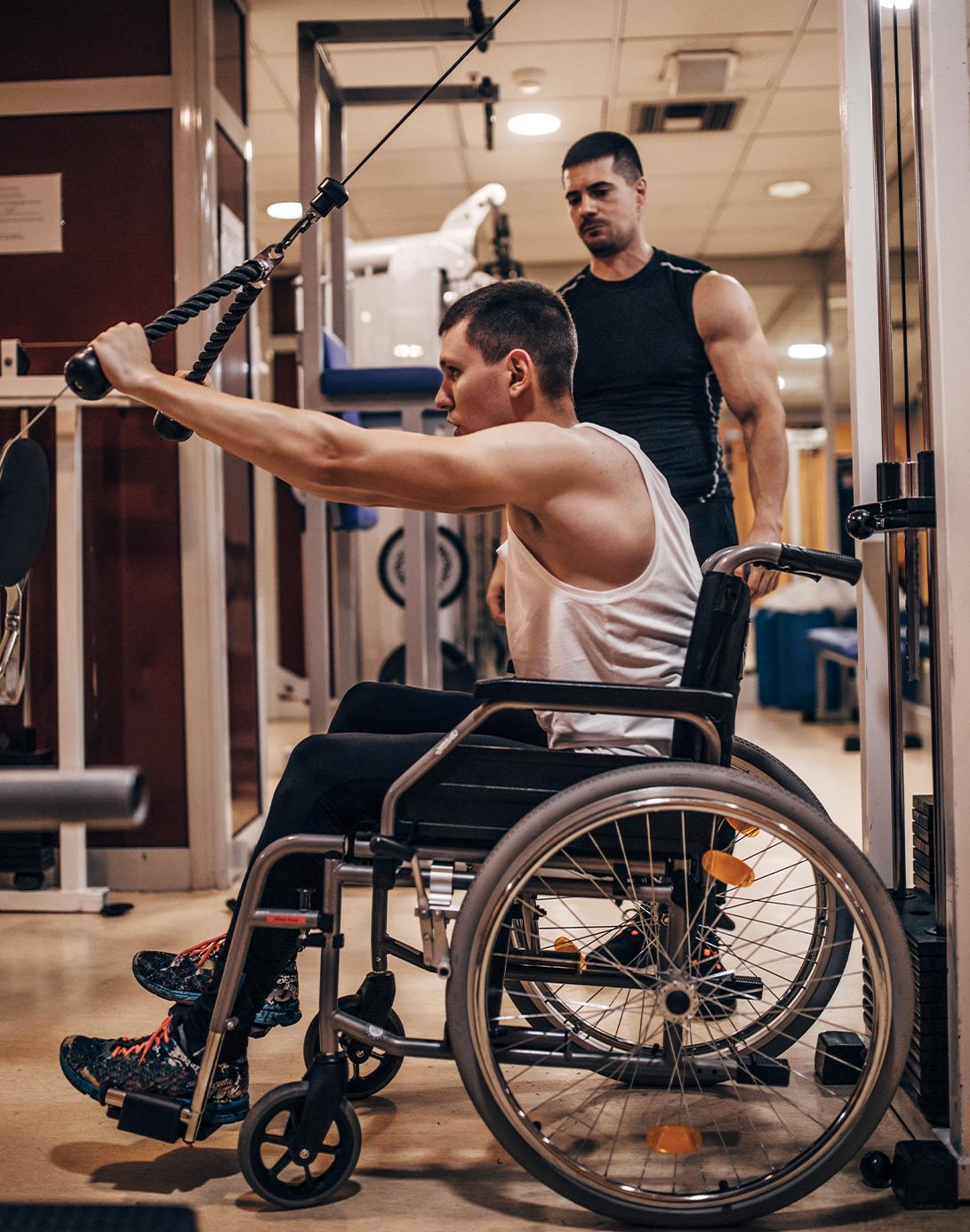What is Permanent Partial Disability (PPD)?
If you injure yourself on the job, you may wonder what a permanent partial disability (PPD) rating means to your workers’ compensation case. The PPD rating is a final medical assessment of your injury related to your ability to function. During your recovery, your doctor will determine if your recovery has plateaued. If your doctor decides you have reached “maximum medical improvement,” the doctor will issue the PPD rating.
How PPD ratings work
The rating is a percentage of your current functioning and range of motion compared to your pre-injury abilities. The American Medical Association’s Guide to Impairment (5th Edition) serves as the physician’s road map for determining your appropriate PPD rating.
The PPD rating influences the benefit levels you may receive, whereas Georgia’s Workers’ Compensation Act provides compensation based in part on this rating. See the legal table found in O.C.G.A. §34-9-263.
Understanding PPD Ratings and Their Role in Georgia Workers’ Compensation
The concept of Permanent Partial Disability (PPD) under Georgia law is defined as a disability that is partial in character but permanent in quality. This disability results in the loss or reduced use of a body part or overall functionality due to a work-related injury. A PPD rating, issued by the authorized treating physician, is a medical assessment of how the injury has impacted the worker's range of motion and overall bodily functions.
Physicians determine this rating after the injured worker reaches “maximum medical improvement” (MMI), the point where no further significant recovery is expected. Using the American Medical Association’s Guide to Impairment, the physician assigns a percentage to reflect the worker’s reduced functionality compared to pre-injury levels.

The Georgia Workers’ Compensation Act uses this impairment percentage to determine benefit levels. The statutory table in O.C.G.A. §34-9-263 provides a framework for calculating compensation. In situations where doctors disagree on the rating, workers have the option to seek a second opinion to ensure a fair evaluation.
Understanding how Permanent Partial Disability compensation is calculated can help you better prepare for your workers’ compensation case. Below is an overview of the calculation process.
With this understanding of how PPD ratings influence benefits, here’s how Georgia law specifically defines and applies these ratings.
Georgia law defines PPD as a disability “partial in character but permanent in quality resulting in a loss or loss of use of body members or from the partial loss of use of the injured employee’s body.” This means the injury you sustained keeps you from using the full functionality of your body or a body part.
In certain circumstances, doctors may disagree on the ratings. You may have the option of seeking a second opinion. We can help you through this process and help you find the doctors you need.
What Happens After Maximum Medical Improvement (MMI)?
When an injured worker reaches MMI, the treating physician evaluates their condition and assigns a PPD rating. This rating forms the basis for calculating compensation under the Georgia Workers’ Compensation Act. After the rating is assigned, the workers’ compensation board reviews it to ensure consistency with state regulations.
In some cases, the assigned rating might differ due to varying opinions among doctors. Workers have the right to contest the rating and request an independent evaluation. Additionally, Georgia’s workers’ compensation system allows for the negotiation of payment frequencies—whether weekly, bi-weekly, or upfront in a lump sum.

Navigating this process can be complex, especially when considering factors like social security benefits or varying state regulations. For example, total benefits for PPD cannot be less than the amount already received from social security.
Contact Ramos & Law for the benefits you deserve
Navigating the alphabet soup of workers’ compensation can be a trying experience, particularly for a person who is hurt and unable to work. Partial Permanent Disability cases involving head trauma should be reviewed by a brain and head injuries lawyer to ensure fair compensation. If you are unclear as to what PPD means to your case or questioning the rating you have received, please call us for a free consultation.
Ramos & Law has supported Georgia’s workforce for nearly a decade, practicing 100% Workers’ Compensation.

More resources are available
REPRESENTATIVE CASES
These case studies are not meant to promise or guarantee a certain or similar result, but rather to demonstrate the legal attention and work ethic our attorneys assert in our cases. Every case is different and is fact sensitive. Certain facts can greatly influence and determine a client’s award, outcome, and recovery. Injuries to the back and neck are common, but trauma to the head may require assistance from a head and brain injuries attorney for specialized claims.
Back Strain
An employee worked for a manufacturer of outdoor power products in Middle Georgia. His job required him to pull pallets of material across the work area. As a result, he experienced a back strain. The manufacturer denied the claim and contested his need for medical care. Ramos & Law was able to secure helpful diagnostic scans and meaningful medical care for the injured worker. After a few months of litigation, the parties reached a settlement of $65,000 with a complete resolution of all outstanding medical bills.
Foot Injury
An employee was stocking heavy merchandise for a large retailer in Columbus, Georgia. During the course of her job duties, a stocking cart of the merchandise fell on her right foot and great toe. The national retailer directed her to its company doctors but she received very little relief. The attorneys at Ramos & Law were able to navigate her medical care to more qualified doctors where she received a better overall results. As she reached maximum medical improvement, the large retailer settled the claim for over $100,000 and paid for all of her past medical treatment.
Failed Back Syndrome
An employee was working part-time for a large automotive parts store. The employee fell off a ladder injuring his teeth, neck, ribs, and low back. After exhausting conservative medical care, physical therapy, injection regimens, and medication, it became clear that this injured employee required the need for spinal surgery. While the insurance company fought the surgery, Ramos & Law was able to force the insurance company into paying for the surgery and associated therapies including the implant of a spinal cord stimulator. Given the severity of the injury, Ramos & Law was able to refer the client to a federal disability benefit specialist who assisted him in securing Social Security. This part-time employee settled his case for $185,000 plus almost $300,000 in future medical care.
Low Back Herniations
A pediatric physician injured his back while assisting a child off an examining room table. As a result, the physician herniated several discs in his spine which also triggered depressive mental episodes. While the insurance company denied medical coverage for his numerous symptoms, Ramos & Law was able to secure quality medical care for the employee including orthopedic care, psychiatric treatment, a spinal cord stimulator, and physical therapy. Additionally, the employee received on-going income benefits at the maximum workers' compensation rate. At the end of the case, the matter settled for a figure close to $250,000 in addition to payment of previous medical bills.
Shoulder Injury
An employee at a beverage maker in Atlanta was stocking heavy cases of merchandise when she felt severe neck and shoulder pain. It was revealed that she suffered a torn rotator cuff. While the beverage maker initially denied her medical care, Ramos & Law was able to convince the employer to approve her treatment plan and accept the case. After months attempting to return to work, it was clear that the employer was not able to accommodate her medical limitations. As a result, the case settled for $115,000, along with all her medical bills being paid.
Severe Burn
A part-time grocery employee fell into a tub of “degreaser” that caused severe third degree burns over his torso and buttocks region. The employee required immediate medical care and several weeks in the intensive care unit within the local burn center. The costs of the care reached in the millions of dollars. While the grocery store denied liability for the accident, the attorneys at Ramos & Law were able to secure a settlement of $250,000 in addition to the employer’s acknowledgment to pay for all past medical bills.




